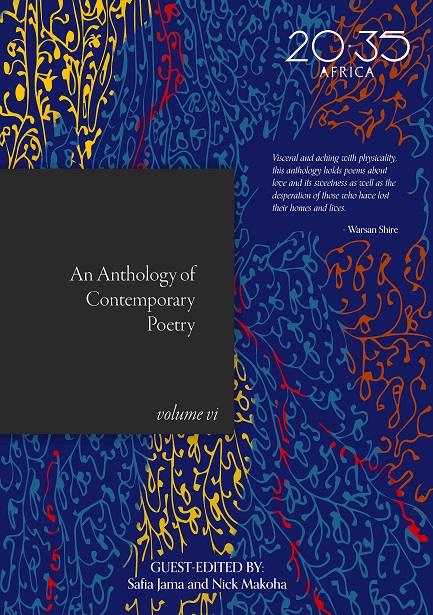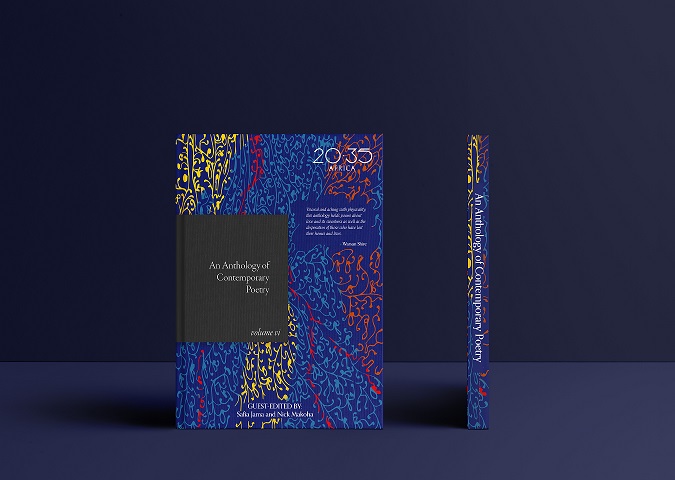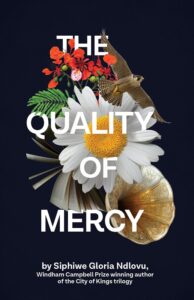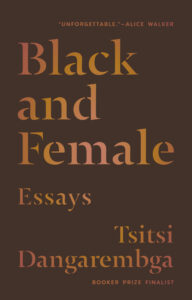Introduction to 20.35 Africa Vol. VI
Edited by Safia Jama and Nick Makoha
Introduction by Precious Okpechi
Every era of poetry has an identifiable quality which critics have tried to define: as romantic, modern, postcolonial, contemporary. They categorize poets based on the time of their work, an acknowledgement of how impossible it is to do so based on “what they are writing about” and “how they are going about it.” History therefore shapes the lives of poets, individually and communally, which is how our present writing is always in communication with the past and perceived future. And so, the experiences of a generation define their philosophies about life, and their philosophies about life, in turn, define their writing. But none of these determine the approach a generation of poets will take in documenting their experiences.

The poets in 20.35 Africa Vol. VI are creating a new tradition in their work. They understand that history evolves with us. In Precious Arinze’s “What the Body Houses,” the pain, listlessness, and joy of it, like survival instincts, are encoded in our genes:
After years of being harmed by poaching, African elephants are evolving / without tusks. / Perhaps, that is what living is. / The loss we inflict on our being to survive a little longer.
Writing within contained history and present experience is how poetic tradition and the “quality” of a generation of poets establishes itself. Poetic traditions then are activities, and, like every activity, are susceptible to change.
One of the foci of these poets is the praise, reverence for, and interrogation of the body. It is written about as a literal subject, an object of correlation, used as a metaphor, or written into a myth, as in Zaynab Bobi’s “Jana”:
Reporter: her body. plays three bullets. strays
into three bullets. stays in three bullets. like the myth.
From liberating lens, this could be a claim of ownership, defiance against forces acting outside of our existence as we know it. This is not a means to adopt a utopia in which the poets attempt to shift the body away from the “fracturing” the universe exacts on it; it is instead a claiming of the joy, the inhumanity and sorrow of it, and the inevitability of this co-existence.
The body is the one physical and direct link we have to the universe, and interrogating this link is a means to understanding that age-old question: What is the meaning of life? This is the logic that permeates Toju Lusan’s “Heart”:
The heart is limited in its pursuit, / valves opened and closed like doors / leading nowhere. What being / designs its own destruction, falls / short of longings it feeds the earth / like a reluctant mother, baring / nipple to teeth.
These poems are not afraid to take risks, in form and subject matter. They range from stereotypical, “exotic” subjects expected of African and black artists, to those not expected of us, whatever is important to its creator. In “back it taking,” Ernest Ohia writes in reverse from the right margin about a past love and the pain of forgetting:
?vanquished the become I did when
path righteous their on ,hopes my —detailed ,intentional
,you for devotion my .fruition seek ,universe the to
remnant the :become we’ve agree I what .sooner replace must I
phone the over held conversation a of
In “Lens Theory #1,” Abigail Mengesha writes about child soldiers, how they are forced into wars, and made to lose their innocence, joy. The poem asks that we look at what is omitted in the photographs and “captions” we see on the news:
Here, a stationed tank and rock barricades. There, one boy’s smirk flashing against the backdrop of patchy fields. Look away and they vanish. Look again and the armed children still look back. The what-were made motionless above the photographer’s caption: highly motivated young recruits—
Cianga writes about the limitedness of language, and its inability to capture a pure feeling. In her “In Defense of French,” the persona is unable to find the right words to describe the longing for her mother and what this “absence does to her body”:
no french word for i miss you
instead tu me manque means
you are missing from me
[i.e, you first taste absence on a colonizer’s tongue]
no french word for longing either, nothing for what the absence of Zaire does to me
Love is suffused with the liminal, music, and science in Ola Elhassans’s “Relationship Between Moon & River & Bass.” The persona finds a new way to look at their lover under the moonlight and traces how the movement of their lover’s body is synonymous with those of a bass guitar string and how this catches her heart:
tonight, I notice your skin in faint moonlight your arm moves slow to the ripple of the bass each percussive thud a different side of skin brought to life
a new dimension now apparent at the viscosity of blue light the rhythm changes form it’s buoyant
Each volume in our series marks a new height in showcasing the range in contemporary African poetry. A review in this magazine called Vol. III (2020) “some of the most visceral and philosophical stanzas you’ll read.” Vol. IV (2021) was an opportunity to read African poetry along language aesthetics. Vol. V (2022) had beauty, absurdity, and adopted language to contain violence.
The poems here in Vol. VI reiterate a point that should already be apparent to all readers of poetry: there is no definitive framework that can be used to categorize African poetry. Echoing Toni Morrison and Ocean Vuong’s thoughts on the subject of expectation, one cannot overemphasize that African poets are not “only” their work, and that the poems they write are not just about their experience but also a means to “quest forward” from this experience. This is the legacy that the poets of this generation want to leave behind. ♦
More Book Excerpts from Open Country Mag
— River Spirit by Leila Aboulela
— The Quality of Mercy by Siphiwe Gloria Ndlovu
— Between Starshine and Clay by Sarah Ladipo Manyika
— Black and Female by Tsitsi Dangarembga
— Sankofa by Chibundu Onuzo
— We Once Belonged to the Sea by Diriye Osman
— Biracial Britain: A Different Way of Looking at Race by Remi Adekoya
— The Fugitives by Jamal Mahjoub





One Response
Beautiful as beauty can be. Let’s keep the verses alive.